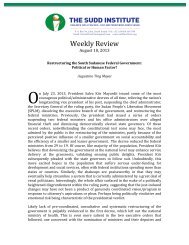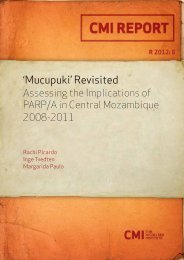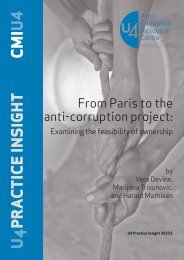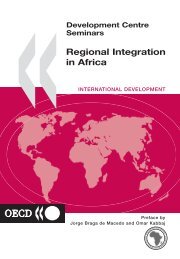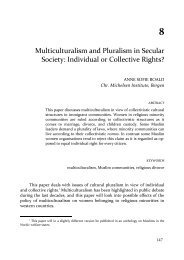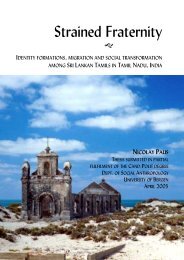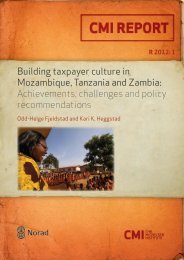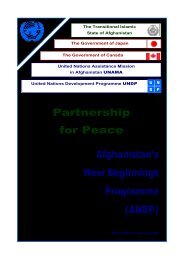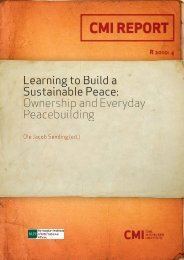Peacebuilding: Lessons for Afghanistan? - CMI
Peacebuilding: Lessons for Afghanistan? - CMI
Peacebuilding: Lessons for Afghanistan? - CMI
You also want an ePaper? Increase the reach of your titles
YUMPU automatically turns print PDFs into web optimized ePapers that Google loves.
modify both the internal Afghan dynamic and the consequences of competition among<br />
regional states.<br />
The need <strong>for</strong> international pressure to sustain the transitional process provided <strong>for</strong> in<br />
the Bonn Agreement is potentially in conflict with another key objective: to make<br />
peace-building a primarily Afghan process rather than alienating it from the polity it is<br />
designed to serve by giving it a heavy <strong>for</strong>eign imprint.<br />
A range of substantive issues has further been identified as critical to the peacebuilding<br />
process:<br />
Civil society<br />
As noted above, a legacy of the past two decades is that Afghan politics are currently<br />
dominated by a handful of parties whose power is based primarily on military <strong>for</strong>ce,<br />
developed in a war economy fuelled by external support. Yet despite the war and the<br />
militarisation of ethnic divisions, social networks and basic norms have not broken<br />
down fundamentally, and a civil society does exist (see chapter 3 below). Given the<br />
limited representativeness of the so-called parties, and equally their moral<br />
responsibility <strong>for</strong> the continued war, there is now an opportunity to bring <strong>for</strong>ward the<br />
tentative ef<strong>for</strong>ts started by UNSMA in the late 1990s to involve people with a<br />
different background in the peace process. The Bonn Agreement has taken some<br />
appropriate steps in this regard.<br />
Security<br />
With the long absence of an authoritative or functioning state, regional or locally<br />
based military groups have entrenched their positions. Founded on a well-established<br />
economy of war, these parties currently represent all military power in <strong>Afghanistan</strong>.<br />
To <strong>for</strong>ge a national army out of these disparate groupings, or to establish a degree of<br />
central control over the security apparatus, is a <strong>for</strong>midable challenge.<br />
The experience of the 1990s has taught the warlords and the parties that militarybased<br />
control over territory is necessary to generate economic and political power<br />
locally, which in turn may secure a position at the national level. Enlisting their<br />
support during the vulnerable transition phase will largely depend on what benefits<br />
the parties and their fighters see in the peace process. Apart from the ability of the<br />
new state and its external supporters to distribute tangible benefits, there is also a<br />
question of legitimacy. As noted above, the present Interim Authority in Kabul may<br />
not have much legitimacy, but the next transitional authority - to be installed in mid-<br />
2002 by a loya jirga - will have considerably more. That body may be able to<br />
deliberate authoritatively on the <strong>for</strong>mation of a national army and decide on sensitive<br />
issues such as regional composition, control and salary structure, and compensation<br />
<strong>for</strong> armed groups that will be disbanded.<br />
Given the complexity and significance of these issues, it would be unwise <strong>for</strong> the<br />
international community to get out ahead of the Afghan political process in re<strong>for</strong>ming<br />
the military structure. More appropriate at this point would be a commitment to<br />
Pashtun tribes to continue the hunt <strong>for</strong> bin Laden in late December effectively strengthened regionally<br />
based military groupings at the very moment when the first post-war national authority was being<br />
installed in Kabul.<br />
8



